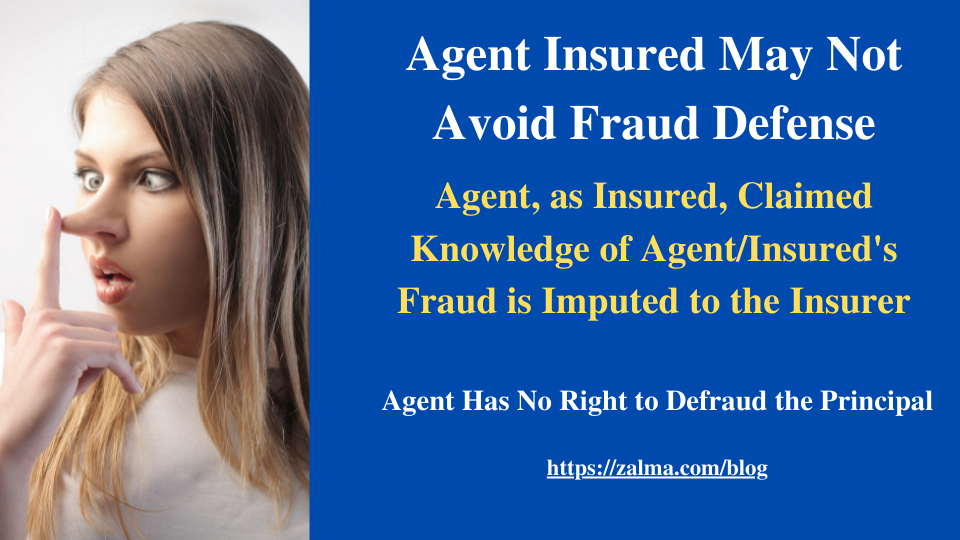-
News Feed
- EXPLORE
-
Pages
-
Groups
-
Events
-
Blogs
-
Marketplace
-
Offers
-
Jobs
-
Developers
Agent Insured May Not Avoid Fraud Defense

Agent, as Insured, Claimed Knowledge of Agent/Insured’s Fraud is Imputed to the Insurer
Read the full article at https://www.linkedin.com/pulse/agent-insured-may-avoid-fraud-defense-barry-zalma-esq-cfe and at https://zalma.com/blog plus more than 4100 posts.
An insurer asserted a fraud defense to claims for death benefits under life insurance policies.
With what the Court of Appeal called “some unusual twists” Security National Life Insurance Company (Security) issued two life insurance policies to its own insurance agent, Destiney Kashia Xiong (Destiney), insuring the life of Wang Y. Xiong (Wang), a man Destiney claimed was her father. When Wang died, Security denied Destiney’s claims and attempted to rescind the policies. In Destiney Kashia Xiong v. Security National Life Insurance Company, No. 2019AP2320, Court of Appeals of Wisconsin, District III (February 22, 2022) the Court of Appeal resolved the issues raised and allowed the case to go to trial with the insurer asserting a fraud defense.
Destiney sued for breach of contract and various torts. Security attempted to plead a fraud defense based on circumstances it claims to have learned of after Wang’s death-including that Wang was not Destiney’s father and that he was unaware the policies were even issued.
The circuit court granted partial summary judgment to Destiney on her breach of contract claim because it determined that Security did not comply with statutory notice requirements before attempting to rescind the policies.
The circuit court agreed with Destiney’s position and determined that Security was statutorily barred from raising fraud as an affirmative defense.
DISCUSSION
Summary Judgment Was Inappropriate on Destiney’s Contract Claim.
The Court of Appeal concluded that Wis.Stat. § 631.09(1) should not operate to permit an agent and policyholder together to misrepresent some material fact otherwise unknown to the insurer.
Thus, where an individual acts in a dual capacity as both agent and policyholder to allegedly defraud the insurer, the “agent” may be considered to have “colluded” with the “policyholder.”
Destiney’s knowledge of any fraud is not imputed to Security under Wis.Stat. § 631.09(4), which the Court of Appeal construed to prohibit the imputation of knowledge to an insurer where a dual agent/policyholder essentially “colludes” with herself.
Destiney’s claims are pure “chutzpah” – unmitigated gall – where she asserts a right to defraud an insurer she serves as an agent. In addition the court should have reported Destiney to the local authorities for attempting to use the courts to perpetrate a fraud.
© 2022 – Barry Zalma
Subscribe to “Zalma on Insurance” at https://zalmaoninsurance.locals.com/subscribe and “Excellence in Claims Handling” at https://barryzalma.substack.com/welcome.
You can contact Mr. Zalma at https://www.zalma.com, https://www.claimschool.com, [email protected] and [email protected] .
We are 100% funded for October.
Thanks to everyone who helped out. 🥰
Xephula monthly operating expenses for 2024 - Server: $143/month - Backup Software: $6/month - Object Storage: $6/month - SMTP Service: $10/month - Stripe Processing Fees: ~$10/month - Total: $175/month
- Art
- Causes
- Crafts
- Crime
- Dance
- Drinks
- Film
- Finance
- Fitness
- Food
- Games
- Gardening
- Health
- Home
- Literature
- Music
- Networking
- Paranormal
- Other
- Politics
- History
- News
- Party
- Science
- Religion
- Shopping
- Sports
- SyFy
- Politically Incorrect
- Philosophy
- Theater
- Technology
- Wellness



